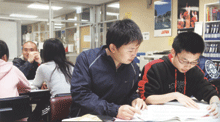An influx of Chinese and Indian students has made education one of Australia’s most successful exports of the past decade, a new study shows. A report by the Reserve Bank of Australia says that while earnings from resources, manufacturing and tourism have wilted over the past year, the country’s income from education has soared. In 2007, foreign students spent A$ 12.1 billion (Rs.49,610 crore) in Australia, and education ‘sales’ have been rising at a rate of 13 percent per year for the past seven years after allowing for inflation.
 This buoyancy is a far cry from a decade ago, when financial crises in Asia saw the flow of students from Thailand, Indonesia and Malaysia dry up. Universities that had become over-reliant on income from students from South-east Asia were badly hit, prompting them to expand their recruitment efforts to other parts of the world.
This buoyancy is a far cry from a decade ago, when financial crises in Asia saw the flow of students from Thailand, Indonesia and Malaysia dry up. Universities that had become over-reliant on income from students from South-east Asia were badly hit, prompting them to expand their recruitment efforts to other parts of the world.
Since then, there has been a rise in the number of students coming from Latin America and Africa, but the major surge is from China and India, which accounted for just 8 percent of education exports in 1997 but 36 percent last year.
The glowing assessment of Australian efforts comes in the same week as a report by the Quality Assurance Agency that analyses similar issues in the UK. The study paints a broadly optimistic picture of overseas student recruitment, concluding that universities are aware of the “substantial learning and cultural issues involved” and “appreciate the importance of meeting expectations and providing specialist support”.
It states that in some UK institutions, particularly in London, international students account for between 20-30 percent of the total student body, with plans for more expansion a common feature.
However, the British report raises concerns about specific problems encountered, including claims that recruitment agents used by universities sometimes supplied inaccurate information to prospective students.
(Excerpted and adapted from Times Higher Education Supplement)